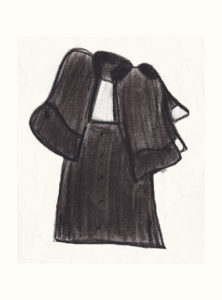“The Law is the expression of the general will. All Citizens have the right to participate personally, or through their Representatives, in its formation. It must be the same for everyone, whether it protects or punishes. All Citizens being equal in his eyes are equally entitled to all dignities, places and public jobs, according to their capacity, and without any distinction other than that of their virtues and talents.”
(Art.6 de la Déclaration des Droits de l’Homme et du Citoyen)

“Lawyers are auxiliaries of the court. They take the oath in these terms : “I swear, as a lawyer, to perform my duties with dignity, conscience, independence, probity and humanity”.”
(Loi n° 90-1259 du 31 décembre 1990)
From dress to court, from writings to words to acts, everything makes sense. It is a judicial, administrative, ordinal language that rhythm procedures and justice.
The lawyer is thus called to bring the voice of the litigants before the competent courts: he is the link between the judges and other authorities and the litigants of the country where he is admitted to practice.
The bond of trust established between the lawyer and his client is the cement of a good working relationship. Many rules reinforce this link.
The lawyer has the tools for a good application of the law at the service of his client and justice, as well as for his understanding, in a complex legal framework both in its content and in its consequences.
As recalled by an author familiar with questions of justice :
“Judges, lawyers, attorneys, everything that grazes on the judicial field, distinguishes two elements in a case: Law and Equity. Fairness results from facts, law is the application of principles to facts. A man can be right in equity, wrong in justice, without the judge being accusable.” (H. de Balzac, in L'Interdiction)
Marie BLANCHON is particularly attached to respect for the principles of the profession and to the guarantee of everyone’s access to law and fair justice.